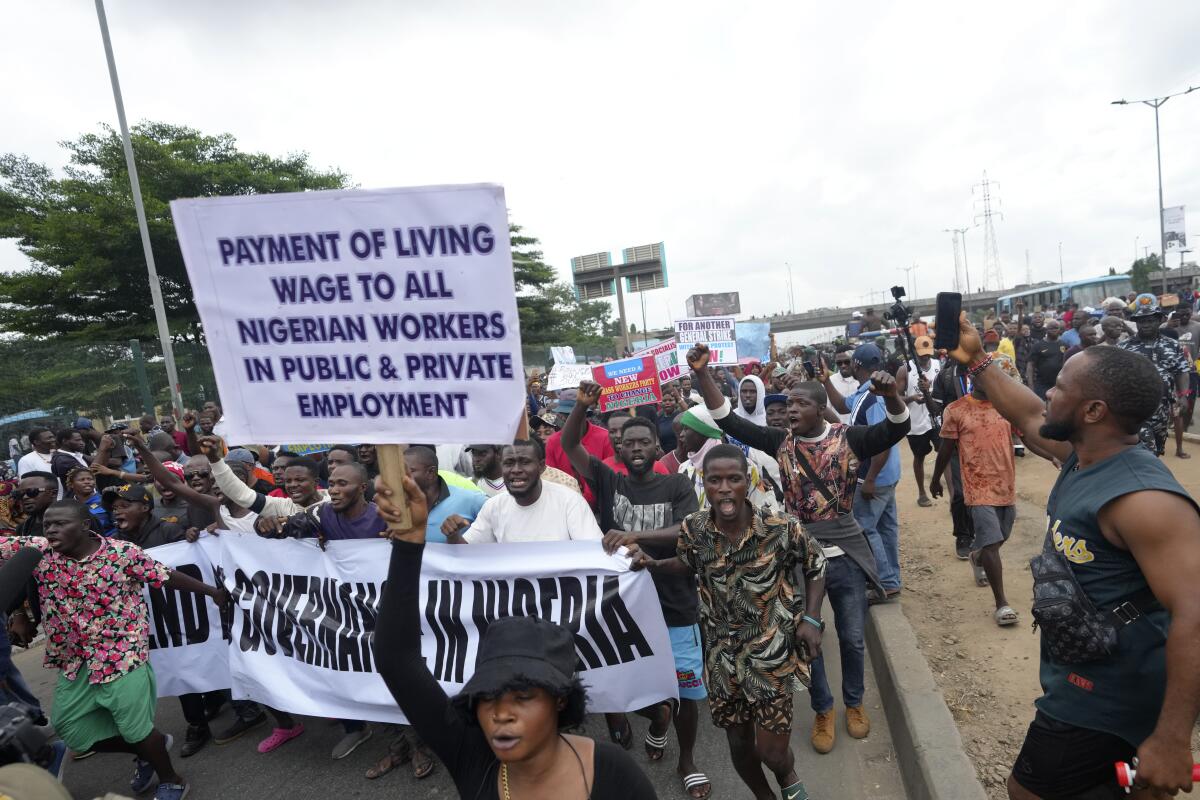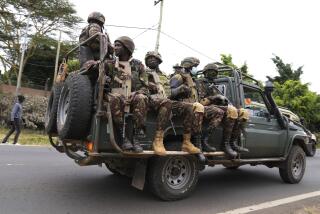Rights group says security forces have killed 9 as Nigerians protest over hunger, hardship

- Share via
ABUJA, Nigeria — Nigerians continued to take to the streets in nationwide demonstrations that have turned deadly, as protesters demand solutions to food shortages and economic insecurity.
At least nine people were killed by Nigerian security forces as protesters clashed with police during the mass demonstrations over the country’s economic crisis, a rights group said Friday, while authorities said a police officer was killed and several others injured.
Four more people were killed and 34 injured Thursday when a bomb went off in the northeastern state of Borno, authorities said.
The state has been racked by the world’s longest war on militancy, which has left millions displaced and hungry.
More than 300 protesters were arrested and curfews were imposed in five northern states after the looting of government and public properties, Nigerian police said.
The police continued to fire tear gas at protesters in various locations as they regrouped Friday.
Africa’s most populous country has ground to a halt as Nigeria’s largest labor unions begin striking to demand a salary increase.
National police chief Kayode Egbetokun said Thursday night that the police were on red alert and may seek the help of the military.
Amnesty International’s Nigeria director, Isa Sanusi, said in an interview that the group independently verified deaths that were reported by witnesses, families of the victims, and lawyers.
The protests were mainly over food shortages and accusations of misgovernment and corruption in Africa’s most populous country.
Nigeria’s public officials are among the best paid in Africa, a stark contrast in a country that has some of the world’s poorest and hungriest people despite being one of the continent’s top oil producers.
Carrying placards, bells and Nigeria’s green-and-white flag, the mostly young protesters chanted songs as they listed their demands, including the reinstatement of gas and electricity subsidies that were canceled as part of an economic reform effort.
Violence and looting were concentrated in Nigeria’s northern states, which are among the hardest hit by hunger and insecurity. Dozens of protesters were seen running with stolen goods including furniture and gallons of cooking oil.
Egbetokun, the police chief, said officers “aimed at ensuring peaceful conduct.” But, he added, “regrettably, events in some major cities today showed that what was being instigated was mass uprising and looting, not protest.”
The police chief’s claim was disputed by rights groups and activists.
“Our findings so far show that security personnel at the locations where lives were lost deliberately used tactics designed to kill,” Sanusi said.
On Wednesday night, another bomb that exploded at a roadside market in Borno state killed at least 16 people, police said.
No one immediately claimed responsibility, but analysts suspected the Islamic militant group Boko Haram, which has since 2009 waged an insurgency in Nigeria and neighboring countries in the Lake Chad region.
Boko Haram and its splinter group the Islamic State West Africa Province have contributed to a humanitarian disaster in Nigeria, Cameroon, Niger and Chad, with more than 35,000 people killed and 2.6 million others displaced over the last 15 years.
The groups want to install an Islamic state across the four countries but mainly in Nigeria, whose more than 200 million people are divided almost equally between a mainly Christian south and a predominantly Muslim north.
The Nigerian government has claimed progress against the insurgency, but Boko Haram and Islamic State West Africa Province have expanded into other regions, including central Nigeria, where the capital, Abuja, is located, according to experts and public records on counterterrorism.
Asadu writes for the Associated Press. Times staff contributed to this report.
More to Read
Sign up for Essential California
The most important California stories and recommendations in your inbox every morning.
You may occasionally receive promotional content from the Los Angeles Times.











